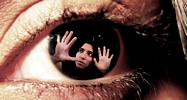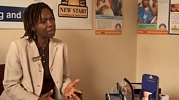As anyone with asthma will know, worrying about suffering an asthma attack (medically known as an "acute exacerbation" of asthma) is something that prevails throughout life and can sometime limit what a person does. For example I know one person who will get an asthma attack if they go anywhere near fireworks, so to go and view fireworks displays in person is a big NO!
One would hope that an asthma sufferer has a well managed care plan given by a Respiratory Physician.
So what does happen in an Asthma Attack?
During an asthma attack, the muscles around the airways tighten, or "spasm" (like when you make a fist), the lining inside the airways swells or thickens and gets clogged with lots of thick mucous. This unfortunately has the effect of making the airways much skinnier than usual so it is harder to move air in and out of the air sacs.Thus making it harder to breathe!
During an asthma attack, it is harder to breatheoutthan it is to breathe in. This means that during an asthma attack, it takes much longer to breathe outthanit does to breathe in.
But what to do, if and when an attack happens, firstly one must keep in mind that when an attack hits, dealing with it effectively is an absolute essential. While the vast majority of the work will be done by your prescribed medication, there are things you can do to shorten and hopefully cease an attack:
Many people do take their Inhalers when they start to feel their chest tighten – thus preventing an acute episode, but if one does happen -
Remain Calm.
No one is disputing that asthma attacks – no matter how familiar they are – are frightening. It is a natural human instinct to want to be able to breathe and when an asthma attack prevents this, we naturally panic.
However, this can actually may an attack worse. A side effect of panic itself is shortness of breath – something that you don't need when you're already suffering an asthma attack and finding it hard to breathe out.
Try and keep calm throughout, wherever possible.
–Don't Snatch For Breath.
As part of the panic response, we are inclined to 'snatch' for breath – that is, short and sharp breaths that do not actually meet our oxygen needs. As these breaths do not actually help an attack, all they can do is increase panic – and you don't want that.
–Use Your Medication
That's what it's there for. As soon as you feel an attack coming on, reach for your inhalers or any other medical equipment you have to relieve an attack. Always keep your inhalers with you where-ever you go. If possible always have spares available.
Why not take a look and read about what has been getting 5 star rave reviews!
For more information (See resources box)
I wish you and your family the best of health!
Take Care,
Love and Light
Disclaimer
It is important to note that information contained in this post is not intended to replace professional medical advice. Any questions regarding a medical diagnosis or treatment should be directed to a medical practitioner.



